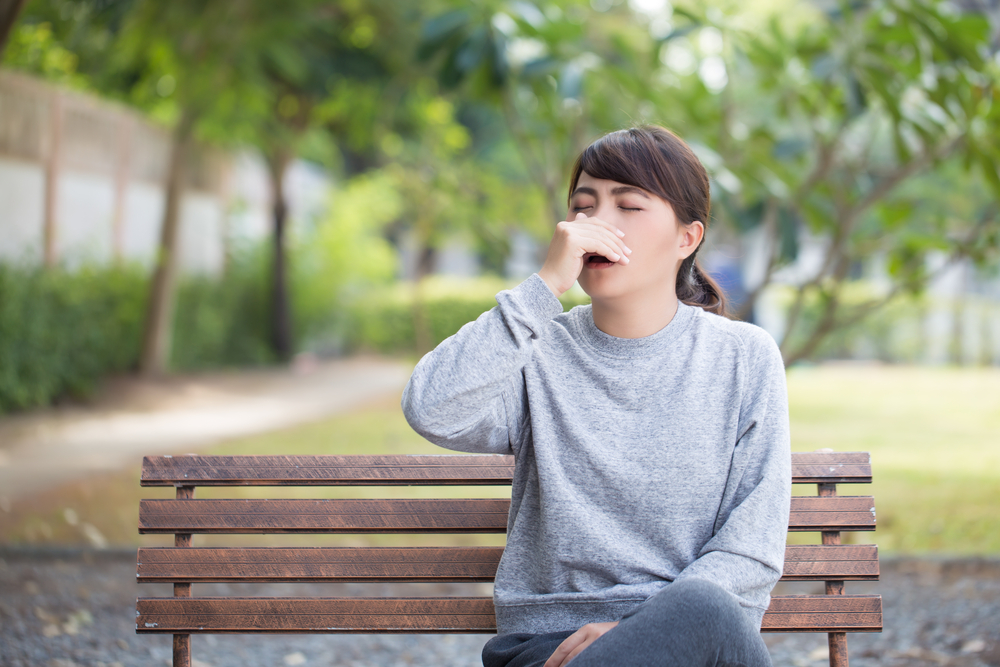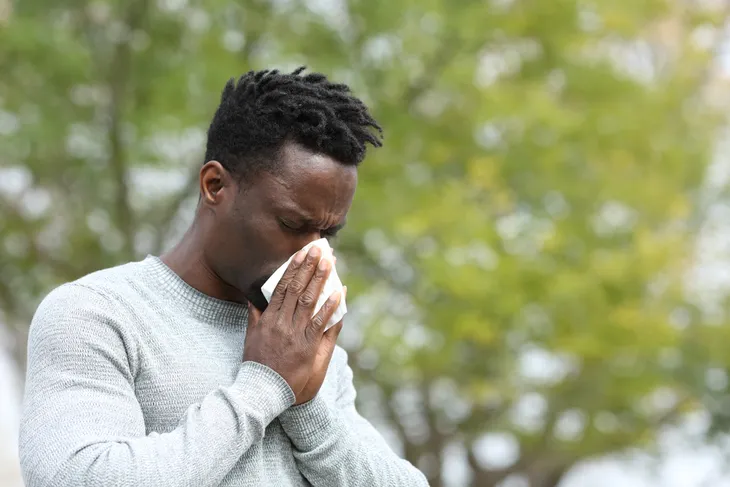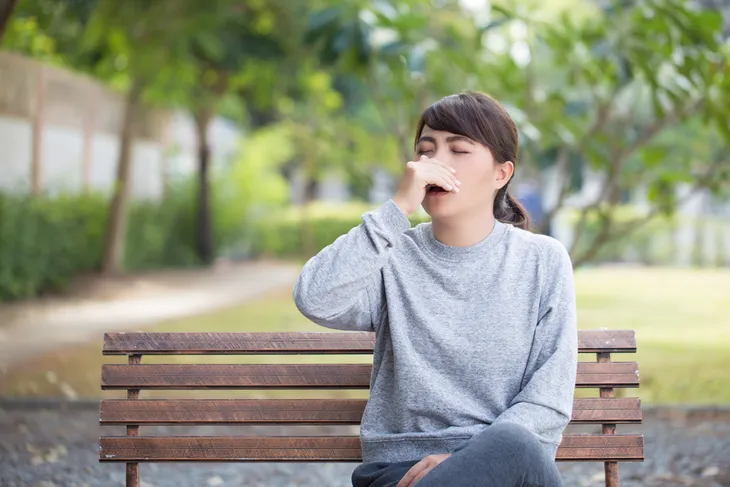- Suffering from nasal congestion, runny nose, itchy eyes, and scratchy throat? You might have a tree pollen allergy.
- Since tree pollen is dry and lightweight, the wind can carry it for miles. Inhaling even small amounts can trigger unpleasant symptoms.
- Trees begin releasing their pollen as early as January, however, some will continue into summer.
- Luckily there are a variety of treatment options available that can help you get relief.
There’s nothing more refreshing than spending time outdoors after a cold season. But getting outdoors during peak pollen season can be a serious struggle for allergy sufferers. If you get an itchy, runny nose or scratchy throat when spending time outside, you might have a tree pollen allergy.
The good news is you don’t have to be stuck inside. Allergy sufferers can find relief through a variety of treatments from medication to at-home remedies. Follow along as we explore everything you need to know about tree pollen allergies, including the types of trees that cause allergies, the common symptoms, and treatment options.
What Is a Pollen Allergy?
Pollen is actually an important part of nature. “During growing seasons, pollen spreads through the air and fertilizes plants,” explains Medical News Today. But what is it exactly? Pollen is a fine powder that flowers, grass, weeds, and trees produce.
While pollen can be harmless to some, others develop allergic responses when breathing it in. When this happens, the immune system identifies pollen as a threat. The body then produces chemicals like histamine to fight against the pollen and this is what causes the allergic reaction.
Types of Trees That Cause Allergies
Tree pollen that triggers allergy symptoms is very fine and since it’s so lightweight, the wind can carry the pollen for miles. Inhaling even small amounts can trigger unpleasant symptoms. According to Healthline, trees begin releasing their pollen as early as January, however, some will continue into summer.
The good news is that “only about 100 of the more than 50,000 tree species cause allergies,” says the source. Some of the worst tree allergens include:
- red maple
- mulberry
- ash
- birch
- box elder
- date palm
- cedar
- alder
- pecan
- sycamore
- beech
- cottonwood
- elm
- hickory
- willow
- oak
- Phoenix palm
- juniper
- walnut
- silver maple
Common Symptoms of Pollen Allergies
Allergy symptoms can often mimic symptoms of the common cold but there are some key differences. For starters, WebMD says, unlike colds, allergies never cause aches or fever. Allergies also usually last for months, whereas a cold typically lasts for 3- to 14-days. Colds are also contagious whereas allergies are not. If you’re showing symptoms and other people in your house aren’t getting sick, it’s likely you’re suffering from allergies.
Common symptoms of allergies include itchy or watery eyes as well as an itchy throat. Sufferers also often experience sneezing, a runny nose, and nasal congestion. Some may even experience wheezing.
Factors that Can Make Allergies Worse
Certain factors can make your allergy symptoms worse. For example, WebMD says your symptoms may be exacerbated on warm windy days. This is because the wind can pick up the dry, lightweight pollen, sending it through the air and into your lungs when you inhale.
Having trigger trees in your yard can make symptoms much worse too as it exposes you to “10 times as much pollen as a tree down the street,” explains the source. Finally, if you’re allergic to some types of trees, such as birch trees you may also experience allergic reactions to eating foods like almonds, hazelnuts, celery, carrots, apples, cherries, kiwi, peaches, pears, or plums.
Diagnosing a Pollen Allergy
If you think you may have a tree pollen allergy you can contact your doctor for a proper diagnosis and to find out which culprits are triggering your symptoms. Healthline says your primary care physician can usually diagnose the allergy, but it’s also common to be referred to an allergist for allergy testing.
Allergy testing typically starts with reviewing your medical history and symptoms. The next step is to do a skin prick test which involves pricking your skin and inserting small amounts of potential allergens. Then you wait to see if you react to the allergen. If you’re allergic, your body will typically respond with a reddish, elevated bump. Healthline says reactions typically develop within 15- to 20-minutes. The source also says allergy testing can also be done by blood work.
Treating Allergies
While you can’t cure seasonal allergies, there are effective treatments available that can provide relief. For starters, you may find that over-the-counter allergy medications may be effective in reducing your symptoms. If these fail to ease your symptoms, you may require a prescription medication from your doctor.
Medical News Today says immunotherapy may also be an option for long-term management. Essentially it desensitizes the body to pollen. That said, the source says it can take several years to complete. Talk to your doctor to find out the best treatment option for you.
In the meantime, there are other strategies you can try at home to help reduce your symptoms. Let’s take a look at these next.
Remove Trees That Trigger Your Allergies
If you’re severely allergic to tree pollen and one of the trees that trigger your symptoms is in your yard, it might be time to have it removed. As we mentioned earlier, having trigger trees in your yard exposes you to 10 times as much pollen.
If removing a tree isn’t an option, WebMD says you can at least prune back the branches. This can help reduce the amount of pollen the tree releases.
Stay Indoors During Windy Days
While you may be itching to get outdoors, it might be best to stay indoors, especially during windy days. As we already know, the wind can carry pollen for miles, and inhaling the outdoor air will make your symptoms worse.
While inside, be sure to keep your windows and doors closed to prevent pollen from entering your home. While you may want fresh air, it’s best to rely on the air conditioner when pollen counts are high. Most AC units are also equipped with HEPA filters that can trap and filter out pollen from the air you breathe. The same applies when you’re driving in the car — keep the windows closed and turn the AC on.
Keep an Eye on the Daily Pollen Count
Another effective way in reducing your exposure to tree pollen is to keep an eye on the daily pollen count. You can find this information easily on weather apps or through a quick online search. They’ll usually tell you which type of pollen is high too.
In general, pollen counts tend to be higher on dry, windy days and lower at night or after rainfall. They also usually peak around 5 am to 10 am and again later in the evening around dusk. When tree pollen counts are high, avoid going outdoors.
Keep Your Home Clean
You can also prevent exposure to pollen by keeping your home clean. Just like other common allergens, such as dust and pet dander, tree pollen can settle in your home, especially if you keep your windows or doors open. This is why cleaning your home regularly is important.
During allergy seasons it might be best to vacuum your home a few times per week. It’s also a good idea to invest in a HEPA filter vacuum to trap allergen particles. You should also wash your bedding in hot, soapy water at least once per week. Finally, you may want to invest in an air purifier with a HEPA filter to help improve the air in your home.
Keep Your Body Free of Pollen
Pollen can also settle on your skin and in your hair, especially when you spend time outdoors. Get in the habit of regularly washing your hands and avoid touching your face.
If the pollen count is really high, you may even need to take a shower and change your clothing after being outside. At the very least, be sure to shower before going to sleep to make sure you don’t track pollen into your bed.
When to See a Doctor
Although a nuisance, many people can manage their allergy symptoms at home. That said, if your symptoms become severe or if you develop unpleasant side effects from your allergy medication, you should see your doctor. Severe symptoms may require prescription medication and if you have side effects from your current medication, your doctor may need to adjust your dosage or try an alternate treatment.
It’s always important to consult your doctor before taking any new medication, herbs, or supplements, especially if you’re taking other medications. Some can “interfere with the effectiveness of certain medications,” explains Healthline.















